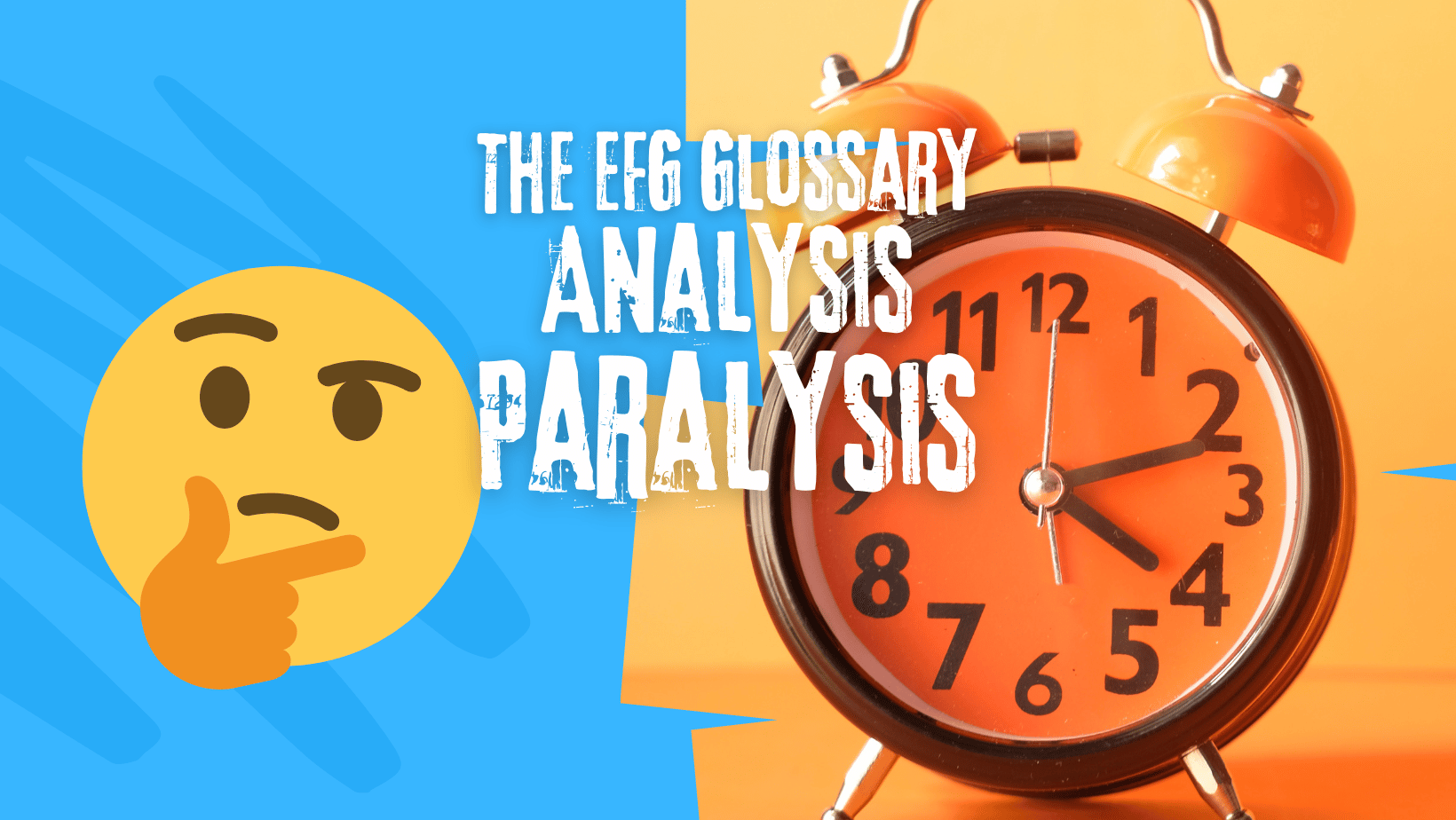Every week the EFG staff will be defining a gaming term that is either confusing or ill-defined. Please leave a comment with any terms you find confusing and we will try to include them in future editions!
The gaming definition this week is applicable to board games and tabletop role-playing games, the term applies widely beyond gaming:
Analysis Paralysis

The term Analysis Paralysis is common in board games. However, it is applicable in all gaming, and within decision-making in work and life in general. With Analysis Paralysis many choices are available, often too many choices. The decision maker out of anxiety or a fear of making the wrong decision my take excessive time making their decision, or in extreme cases make no decision at all.
In-game settings, the player spends an excessive amount of time considering their options and plotting the implications. This excessive time can often negatively impact other players by extending the game time and forcing long waits between turns. Often players overthink their options. It can be very frustrating for other players in the game when the gameplay time is extended for this reason. These long wait times take away from the game experience of other players. There are multiple ways to address and mitigate some of the decision making which will be discussed below.
History:
The idea of being paralyzed by decision-making is an old one. We can see a reference to it, though not used by name, in Aesop’s fable The Fox and the Cat. The fable tells of a Fox and Cat that each has tricks to escape the hounds. The cat only had one trick and the Fox had “a whole sackful”. Once threatened by the hounds, that cat did its one trick for an escape without hesitation. The Fox meanwhile started and restarted with different tricks and was unable to escape. You can read the full story here. The idea of the fable is that one may have so many options their failure to act on any of them can be detrimental.
The phrase Analysis Paralysis is credited with being paired together in an 1803 pronouncing dictionary. These words became paired for their rhyming, and also for the memorable phrase they created. The concept has long existed but this phrasing captured it in a more concise manner.

Ways Minimize Analysis Paralysis
With Analysis Paralysis being an old problem, there is a classic game that has come up with a solution. In Chess, players can use a Chess Clock. This is a special clock with two clocks so players can track their available time to make their moves.
Strategies to Minimize Analysis Paralysis in Gaming:
- Timers/chess clock: By limiting time it reduces the negative impact on other players. A timer provides incentives to prevent overanalyzing the choices, as well as a hard stop to analyzing choices.
- Choose games with limited choices per turn. By starting with fewer choices it reduces the need for a long analysis of choices.
- Slowly include games that add more choices. Rather than jumping right to a game with many choices, try to increase the game complexity and choices available incrementally to build the habit of a short decision-making time.
- Perfect decisions are not the key, so building a culture where perfection is not the goal. The culture at a gaming session is critical to the comfort of players overall, but it can play a major factor in decision-making. If a player feels safe to take a risk and not worry about negative comments they may not be so fixated on making the “right” move.
- Focus on your main objective, if there are multiple. In more complex games there are usually multiple parts of the game and aspects to focus on. When there are many decisions to make, it can be helpful to go back to the main objective to limit the scope of your choices.
Strategies To Minimize Analysis Paralysis Outside of Gaming
- Focus on your main objective, if there are multiple: Just like in gaming, when there are multiple objectives, what is the main or most important one. Use that to guide your focus and narrow the relevant choices.
- Set a time frame/ timer: Create a hard time limit if one does not already exist. Time limits help to focus the analysis by having a firm ending time.
- Prioritize the Options: Try to eliminate some of the less optimal options. One great strategy is making a list so you can see the options and then cross off less important or optimal options.
- Take a break: If you are able to, take a break from analyzing your choices. By stepping away from the active analysis you can come back with fresh eyes to the options to aid in decision-making.
- Ask for Advise: If there is an expert or someone more experienced you can seek their insights and thoughts. They may have a valuable perspective to focus on the most important options you have in your decision-making.
Final Thoughts
Analysis Paralysis is often a term used in gaming, but is certainly not limited to gaming. Many of the strategies above can be applied to all aspects of decision-making. If you find yourself frozen, and struggling to make a decision see if one or more strategy helps you.
What do you think? Sound off in the comments and let us know your thoughts!
Make sure to keep your eyes on Engaged Family Gaming for all of the latest news and reviews you need to Get
Your Family Game On!
- Video Games for kids on Xbox One
- Video Games for kids on PS4
- Video Games for kids on Nintendo Switch
- Board Games for kids
Follow us on Facebook!
Like us on Twitter!
Follow us on Instagram!
Subscribe to our Newsletter!
Subscribe to our Podcast!
